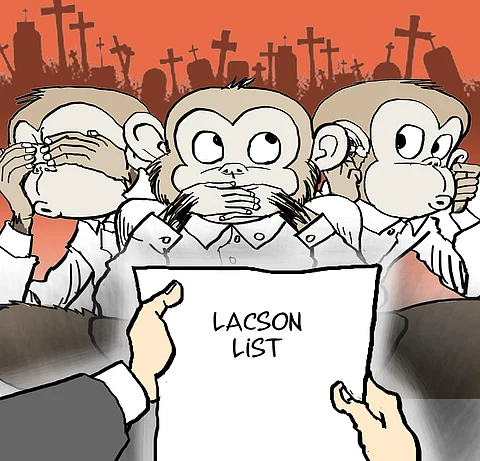
- NEWS
- the EDIT
- COMMENTARY
- BUSINESS
- LIFE
- SHOW
- ACTION
- GLOBAL GOALS
- SNAPS
- DYARYO TIRADA
- MORE

When accused of scheming to remove Vice President Sara Duterte from the 2028 presidential race through a rushed impeachment, members of the House of Representatives held press conferences, delivered privilege speeches, and took to social media to protest the Supreme Court’s ruling declaring the move unconstitutional.
But when Senator Panfilo Lacson accused House members of being part of a corrupt system that siphons off up to 60 percent of public works funds before construction even begins, the response was uncharacteristically muted, if not nonexistent, as of this writing.
Asked to react to Lacson’s latest bombshell, House members said there was nothing to react to yet, claiming it was still “premature” since Lacson has not named names. There’s your cue, Mr. Senator — name the scoundrels or be accused of coddling them.
According to Lacson, in districts where lawmakers or their relatives are in the contracting business, contractors must pay a “passing through” fee of 5 to 6 percent. After taxes and other commissions are deducted, less than 40 percent of the project budget remains for the actual work. The result: smaller structures, substandard materials, and compromised safety.
In flood control projects, such shortcuts can be fatal. The Philippines is one of the most disaster-prone countries in the world, averaging 20 tropical cyclones a year. Over the past two decades, an average of 1,000 Filipinos have died annually in storm-related disasters. In extreme cases, such as typhoon “Haiyan” (Yolanda) in 2013, the toll was nearly 6,300 lives, with damage amounting to P95.5 billion (US$2.2 billion).
Economic losses from storms, floods, and extreme weather average more than P182 billion (US$3.1 billion) a year. Between 2022 and 2050, these disasters are projected to cost the country US$124 billion — about 0.7 percent of GDP annually — with floods and tropical storms accounting for over 90 percent of direct losses. Poorly built infrastructure, weakened by corruption and cost-cutting, only magnifies these losses.
Lacson stressed that the corruption he was describing was not victimless. When a dike is built to a third of its planned length or its foundation is driven in only halfway to specification, the result is infrastructure that fails when it is needed most. In typhoon season, that means homes destroyed, crops lost, livelihoods wiped out — and lives ended prematurely.
The senator also raised a political question: even if implicated, would any congressman face consequences? He noted that some House members contacted him after reports suggested he had a list of 67 lawmakers involved in contracting — identifying themselves without prompting.
So, identify those who approached you, Senator Lacson, lest they think of themselves as sacred cows.
The silence of the House on this matter is more than a political quirk. In the public mind, it risks being read as indifference or complicity. In politics, silence is rarely neutral. When a credible figure raises specific allegations of systemic corruption tied to real-world consequences, the proper response is not to go quiet — it is to call for an immediate, transparent investigation.
That investigation must go beyond rhetoric. DPWH records must be opened. The flow of funds from appropriation to completion must be traced. Lawmakers found to be demanding or accepting “passing through” fees must be named, prosecuted, and barred from further contracts.
If Lacson’s allegations are accurate, billions of pesos are being stolen — not just from the budget, but from the safety and welfare of the Filipino people. The question now is whether Congress will meet this head-on or hide behind silence.
